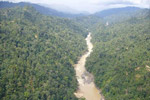A Malaysian court has ruled in favor of indigenous communities in a dispute over land rights just two days after authorities “arbitrarily” destroyed 25 Iban homes in the village of Sungai Sekabai in Sarawak (Malaysian Borneo), reports the Bruno Manser Fund, a rights group. The cases (Agi Ak Bungkong & Ors versus Ladang Sawit Bintulu S/B & Others and Mohd Rambli Kawi versus Lands & Surveys Kuching & Another) had been filed by Iban and Malay communities against the Sarawak state government and an oil palm company that planned to establish an oil palm plantation on native lands.
Sarawak High Court Judge Datuk David Wond ruled that local communities have native customary rights over land claimed as state land by the Sarawak state government. In the ruling, the court said “customary practice of Malays must be given the force of law.” The Bruno Manser Fund called it a “landmark decision.”
See Chee How, a lawyer representing the Iban, called the decisions “a great victory for the people” and said it was “a historic day for Sarawak’s native landowners.”
 Community members outside the courthouse after the decisions. |
But while the rulings set a precedent that could strength native claims to customary lands in Sarawak, the Bruno Manser Fund questioned whether the Sarawak State government will respect the court decisions. The group noted that Iban in Sungai Sekabai won a similar decision in 2001, but have since be embroiled in a dispute over the land with land developers and the Sarawak state government. On Tuesday state police and military demolished more than two dozen indigenous homes in the village, escalating the dispute.
The Sarawak state government has a history of favoring development interests over indigenous customary rights. The government has played a key role in facilitating large-scale destruction of Sarawak’s biologically-rich rainforests, granting concessions to logging companies and oil palm plantation developers. Now the government is pushing a scheme that would create an industrial corridor for mining and energy development. The suite of projects includes at least four hydroelectric dams (up to 28,000MW of power), aluminum-smelting and steel plants, coal mines (1.46 billion metric tons), and natural gas development (nearly 41 billion cubic feet), according the state government.
Environmentalists say the projects will displace indigenous groups and destroy important ecosystems, endangered biodiversity and contributing to Malaysia’s surging greenhouse gas emissions.
Related articles
Malaysian police destroy homes in Borneo indigenous community
(01/20/2010) Malaysian authorities yesterday destroyed two dozen homes in an indigenous Iban community near the town of Bintulu in Sarawak, alleges a human rights group.
Malaysia and China agree to $11 billion deal to build mines, dams in Borneo
(01/13/2010) Malaysia and China today agreed to am $11 billion deal that will turn a vast area of Sarawak, a Malaysian state in northern Borneo, into an industrial corridor for mining and energy development, reports The Financial Times.

(12/22/2009) In James Cameron’s newest film Avatar an alien tribe on a distant planet fights to save their forest home from human invaders bent on mining the planet. The mining company has brought in ex-marines for ‘security’ and will stop at nothing, not even genocide, to secure profits for its shareholders. While Cameron’s film takes place on a planet sporting six-legged rhinos and massive flying lizards, the struggle between corporations and indigenous people is hardly science fiction.
Malaysia to allow logging in indigenous ‘peace park’ to proceed
(12/17/2009) Malaysia, the country with the fastest rate of greenhouse gas emissions growth since 1990 among middle and upper income countries, will allow logging to proceed in a contested rainforest area in Sarawak, on the island of Borneo.
Rainforest tribe sues the Malaysian government for enabling deforestation
(12/10/2009) Five Penan rainforest communities are suing the Sarawak state government and the Malaysian timber giant Samling for violation of their native customary rights, reports the Bruno Manser Fund, a group that works on behalf of indigenous groups in Malaysia.
Malaysian land minister attacks credibility of young indigenous rape victims
(12/07/2009) Speaking to the BBC, James Masing, Sarawak Minister for Land Development, dismissed claims by Penan girls and women who said they had been sexually abused and raped by logging workers in a remote jungle area.
Rainforest tribe declares ‘peace park’ to defend lands from logging in Sarawak
(11/30/2009) In an attempt to block destructive logging of their traditional land, a group of indigenous Penan has declared a “peace park” in the Upper Baram region of Sarawak in Malaysian Borneo, reports the Bruno Manser Fund.
Power, profit, and pollution: dams and the uncertain future of Sarawak

(09/03/2009) Sarawak, land of mystery, legend, and remote upriver tribes. Paradise of lush rainforest and colossal bat-filled caves. Home to unique and bizarre wildlife including flying lemurs, bearcats, orang-utans and rat-eating plants. Center of heavy industry and powerhouse of Southeast Asia. Come again? This jarring image could be the future of Sarawak, a Malaysian state on the island of Borneo, should government plans for a complex of massive hydroelectric dams comes to fruition. The plan, which calls for a network of 12 hydroelectric dams to be built across Sarawak’s rainforests by 2020, is proceeding despite strong opposition from Sarawak’s citizens, environmental groups, and indigenous human rights organizations. By 2037, as many as 51 dams could be constructed.